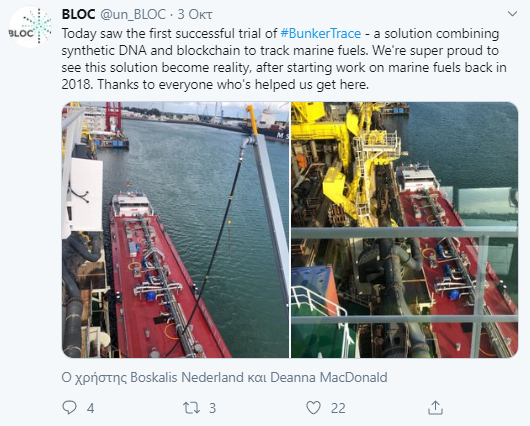Key shipping players partnered and successfully trialled a project concerning the testing of a bunker fuel using blockchain and DNA-marked fuels, which will be able to manage risk for marine fuels by creating a transparent chain of custody.
Taking part in the project were BunkerTrace, Cooperative Bebeka, Boskalis and Minerva.
Specifically, the trial used a tracer, which was added to the fuel while it was being loaded to a Minerva bunker barge, via a dosing pump on the fuel line. BV was the one who verified that the fuel line and receiving cargo tanks were empty. While the fuel was bunkered, the crew of the Prins der Nederlanden used an on-board sampling kit to test for the presence of the tracer.
[smlsubform prepend=”GET THE SAFETY4SEA IN YOUR INBOX!” showname=false emailtxt=”” emailholder=”Enter your email address” showsubmit=true submittxt=”Submit” jsthanks=false thankyou=”Thank you for subscribing to our mailing list”]
The trial lasted for two minutes maximum and detected the presence of the mark at two parts per billion in the fuel.
The testing resulted to the fact that the BunkerTrace system is ready to transform IMO 2020 bunker fuel compliance and increase transparency and traceability in the marine fuels supply chain.
The system works by adding markers to fuel at every stage of the supply chain and recording each transaction in a blockchain-based system. Then, BunkerTrace creates an audit trail that follows the fuel, and any changes made to it, recording all activities and sign offs by actors transacting the fuel.

Marc Johnson, CEO BunkerTrace, commented following the trial commented
This successful trial of BunkerTrace has demonstrated that it’s an easy, reliable means of introducing a level of transparency and traceability into the marine fuel supply chain that we’ve never had before. We’ve had a high level of interest in the product so far, and this is an important step on the way to rolling this out to the market.






























































